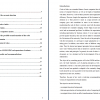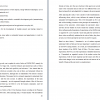Ethical code for GSOM SPbU: updating responsibilities towards students
|
Introduction 4
Chapter 1. Analysis of the current situation
Theoretical background 5
Students as stakeholders 7
Analysis of competitor’s codes of ethics 8
Analysis of GSOM code of ethics 19
Consolidated results of the competitor analysis 21
Chapter 2. Analysis of the possible transformation of the code
Model of the code transformation 25
Factors influencing the content of values 26
Expectations of students 29
Correlation between values of GSOM SPbU and expectations of students 31
Chapter 3. Research results and recommendations
Survey results 33
Interview results 37
Recommendations 41
Conclusion 45
References 47
Appendix 50
Chapter 1. Analysis of the current situation
Theoretical background 5
Students as stakeholders 7
Analysis of competitor’s codes of ethics 8
Analysis of GSOM code of ethics 19
Consolidated results of the competitor analysis 21
Chapter 2. Analysis of the possible transformation of the code
Model of the code transformation 25
Factors influencing the content of values 26
Expectations of students 29
Correlation between values of GSOM SPbU and expectations of students 31
Chapter 3. Research results and recommendations
Survey results 33
Interview results 37
Recommendations 41
Conclusion 45
References 47
Appendix 50
Codes of ethics are a standard feature of most companies these days. It establishes standards and norms of corporate behavior, as well as the rights of stakeholders and the rules of interaction with them. Moreover, a code of ethics promotes intra-organizational cohesion, responsibility and efficiency. However, despite the importance of this document, many companies do not pay due attention to it. They perceive it more as a legal necessity rather than as a tool to help the company grow and consolidate its status in the business environment. The problem of modernizing the code of ethics is relevant, since both the natural environment and the business environment are constantly changing. Society began to pay more attention to global economic, social and environmental problems. In addition, the expectations of stakeholders are changing, including expectations for business schools. It is no longer enough for universities to simply provide quality education, they also need to adhere to sustainable development goals as well as the 3rd mission of the university. Since the code is the principles of an organization’s interaction with the environment, it is necessary to make adjustments to it and reflect the changes that are taking place. In addition, most ethical codes of different companies are very similar to each other. They fix abstract and general principles that are inherently good and correct, but do not carry value without policies that are tailored to a specific business and company and reflect its mission, values and principles. In general, the code of ethics is a very important and necessary document, as it is a strategic tool for the development of the organization and interaction with stakeholders.
The object of my consulting project will be the GSOM and the subject - its Code of Ethics. For now, the Code represents a set of general principles as well as principles for relations with stakeholders. About 15 years have passed since the development of this code, and during all this time it has not been updated or adapted to the constantly changing business environment. The Code should be as close as possible to the real needs and values of the organization, including its employees (in this case, students).
Therefore, the goal of my work is todevelop recommendations for creation of the updated version of responsibilities towards students.
The objectives are the following:
- investigate theoretical background;
- find main peculiarities of existing ethical codes of competing foreign universities;
- investigate factors which can affect transformation of ethical code;
- develop a model of an updated student’s expectations that should be in the code of ethics;
- test this model with the help of survey and interviews;
- formulate recommendations for an updated version of responsibilities towards students.
The object of my consulting project will be the GSOM and the subject - its Code of Ethics. For now, the Code represents a set of general principles as well as principles for relations with stakeholders. About 15 years have passed since the development of this code, and during all this time it has not been updated or adapted to the constantly changing business environment. The Code should be as close as possible to the real needs and values of the organization, including its employees (in this case, students).
Therefore, the goal of my work is todevelop recommendations for creation of the updated version of responsibilities towards students.
The objectives are the following:
- investigate theoretical background;
- find main peculiarities of existing ethical codes of competing foreign universities;
- investigate factors which can affect transformation of ethical code;
- develop a model of an updated student’s expectations that should be in the code of ethics;
- test this model with the help of survey and interviews;
- formulate recommendations for an updated version of responsibilities towards students.
The goal of my consulting work was to update the code of ethics of GSOM SPbU, namely the expectations of students. To begin with, I read the literature and learned that codes of ethics really receive little attention, and often lack specificity and relevance. I also learned that the expectations of students, which are recorded in the code of ethics, are formulated without the participation of the students themselves, although they are stakeholders who directly consume the university’s service - education. This means that it is extremely important to understand what students really need and take this into account. In addition, the expectations of the main stakeholder - the business community - are also expressed through students. After all, the more successful graduates a university has, the better it is for the business community, since the university provides it with new professionals.
Next, I analyzed the codes of ethics of the 10 best business schools according to the Financial Times, as well as the GSOM code. After analyzing them, I became familiar with the different formats of codes, how they are structured, what aspects are recorded in them, and so on. I also came to the conclusion that all codes are very different both in scope and format, but many of them lack specificity and adaptability to changes in the environmental and business environment.
After analyzing the codes, I built a model of code transformation and moved on to the factors influencing values, which, in turn, influence the content of expectations. The first factor is the sustainable development goals. They were formulated in 2015, address many different values and call for building a business on the principles of sustainability. The second factor is the third mission of the university, which implies the university's desire to develop socio-economic activities for the benefit of society outside the academic environment. And finally, the third factor influencing the formulation of expectations is the GSOM strategy until 2025. This strategy is supported by a set of specific values that guide the university to achieve it. However, until these values are officially enshrined in the code of ethics, they have no managerial meaning and are not a tool which can help the university to achieve its goals.
Based on three factors, I formulated a set of student expectations. However, in order to understand which of them are the most important, I conducted a survey among students, as well as interviews among teachers. As a result, my recommendations are two versions of the section about students of the GSOM Code of Ethics. The short version reflects the most important expectations. However, all of the expectations I identified turned out to be necessary in any case, so I formulated an expanded version of the student section that covers a wider range of expectations, both the most important and the minor ones.The new expectations of the code reflect both changes in the environment and the real interests of students, thus working for the benefit of them and the university as a market player.
Next, I analyzed the codes of ethics of the 10 best business schools according to the Financial Times, as well as the GSOM code. After analyzing them, I became familiar with the different formats of codes, how they are structured, what aspects are recorded in them, and so on. I also came to the conclusion that all codes are very different both in scope and format, but many of them lack specificity and adaptability to changes in the environmental and business environment.
After analyzing the codes, I built a model of code transformation and moved on to the factors influencing values, which, in turn, influence the content of expectations. The first factor is the sustainable development goals. They were formulated in 2015, address many different values and call for building a business on the principles of sustainability. The second factor is the third mission of the university, which implies the university's desire to develop socio-economic activities for the benefit of society outside the academic environment. And finally, the third factor influencing the formulation of expectations is the GSOM strategy until 2025. This strategy is supported by a set of specific values that guide the university to achieve it. However, until these values are officially enshrined in the code of ethics, they have no managerial meaning and are not a tool which can help the university to achieve its goals.
Based on three factors, I formulated a set of student expectations. However, in order to understand which of them are the most important, I conducted a survey among students, as well as interviews among teachers. As a result, my recommendations are two versions of the section about students of the GSOM Code of Ethics. The short version reflects the most important expectations. However, all of the expectations I identified turned out to be necessary in any case, so I formulated an expanded version of the student section that covers a wider range of expectations, both the most important and the minor ones.The new expectations of the code reflect both changes in the environment and the real interests of students, thus working for the benefit of them and the university as a market player.





